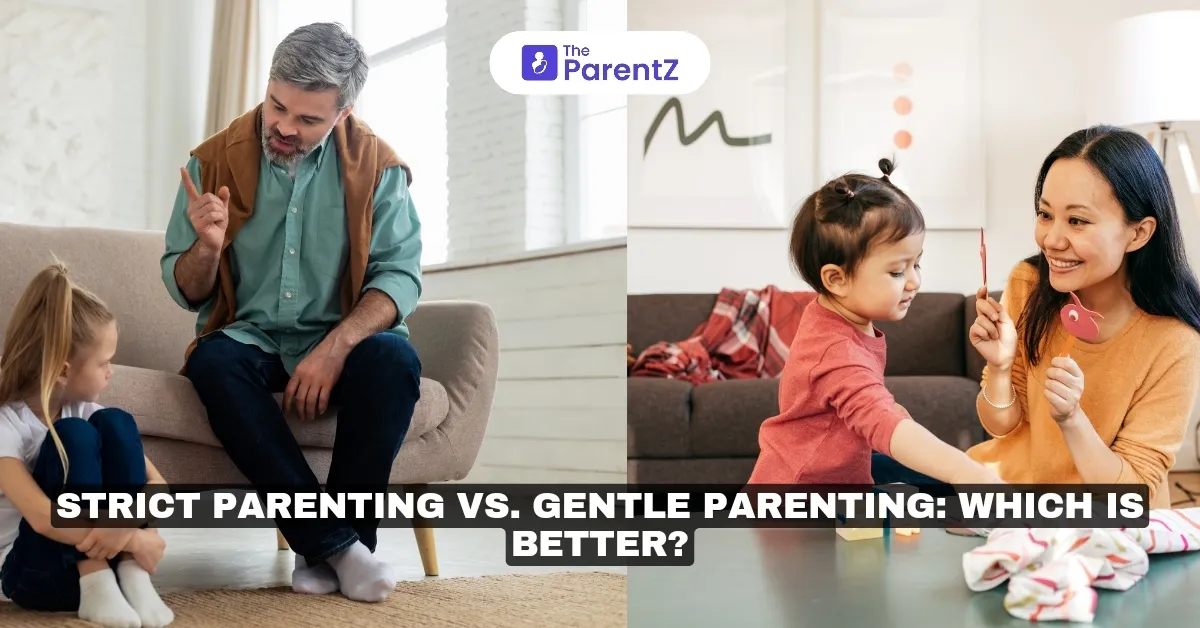The classic debate between strict parenting and gentle parenting still persists—just like the chicken or the egg concept of the parenting world. Every side claims raising happy, confident, and well-behaved kids. So which side wins exactly?
The answer is—it depends.
Read below this article to decide: strict parenting or gentle parenting—which one serves the purpose and which is the better choice.
Strict Parenting: What Is It?
Strict parenting, or what is synonymous to a mini dictator, is about rules, disciplines, and a lot of expectations. Limited screen time, consequences for every mistake—the main goal is to encourage and responsibility in kids.
While studies show that structure can be beneficial for children’s development and that children raised in strict households often become responsible adults, there are times when it can backfire emotionally. Another study also found that 40 percent of students raised in a strict environment have higher chances of excelling at school; the cons cannot be overshadowed.
The Gentle Approach
On the other hand, gentle parenting comes with a lot of calm, patience, and very Zen vibes. It focuses on empathy, respect, and open communication. Moreover, in this approach, instead of harsh punishments, parents who follow this parenting style take time to explain the reasoning behind rules. The idea is discipline rather than controlling. And more like a gentle redirection.
According to the Journal of Child Psychology and Psychiatry, children raised with gentle parenting have better emotional intelligence and resilience skills.
The great thing is —emotional intelligence is a big win in today’s fast-paced world where 58% of success in jobs is tied to EQ over IQ. In the end, gentle parenting approach focuses more on teaching kids how to express their feelings and managing their relationships better.
Can Gentle Parenting Be Too Gentle?
While gentle parenting is a great approach, it doesn't come without critics. The main concern is that kids raised without firm boundaries might struggle with authority later in life.
The final question is: so strict or gentle?
The best way is to adopt a balanced approach where you take in the best tactics from both.
While children need structure, they simultaneously need understanding and emotional support.
According to the Pew Research Study 2023, it was found that 75% of parents believe that combining structure with open communication leads to better long-term outcomes.
The truth is—strictness without empathy leads to rebellion; gentleness without limits leads to chaos.
Overall, you need a bit of firmness and a coating of sweetness for the perfect parenting recipe.
So, When To Be Strict And When To Be Gentle?
Few things, such as screen time, homework schedules, and chores, can all be handled with strict rules. Of course, having some non-negotiables is okay too. However, being gentle when it comes to emotional and mental health is really important.
After all, if your child is dealing with anxiety, being a strict parent won't help; it will just worsen.
Most importantly, whenever your child has the ‘why’ question, don't be afraid to give them the explanation behind your rules.
Takeaway
The truth is, both strict and gentle parenting can work. But it depends on the child and the situation. So pick what’s best for your family and lifestyle, and of course, your kids behavior. While life in this chaotic digital age can be chaotic, raising kids doesn't have a fixed style. In the end, what matters is being a parent who is willing to learn and support, just like your kids are. From having a certain lean towards strictness to not compromising on giving boundless love, a balance is what you need.








Be the first one to comment on this story.